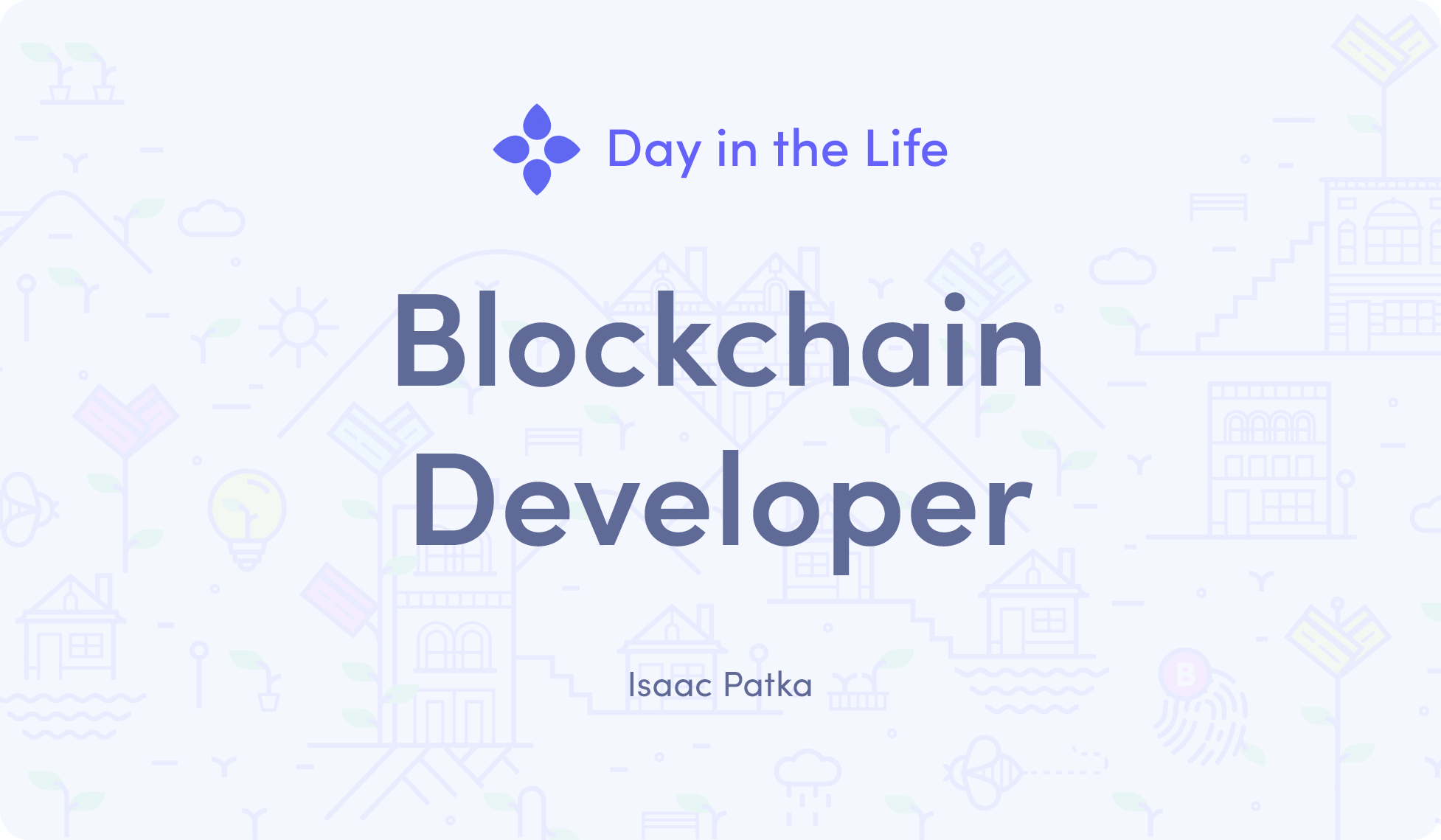A Day in the Life of a Blockchain Developer

Over the next few weeks, we are taking you beyond the screen and into what a typical Day in the Life looks like for Bloom’s team members. This should give you insight into what it’s like to work at Bloom, what we do outside of Bloom, and the benefits of having a distributed team.
Isaac Patka joined Bloom’s product team in April 2018, and he has been an incredible addition to Bloom! Isaac leads many initiatives internally while also speaking publicly about Bloom’s product development efforts. Let’s see what he has to say about life at Bloom.

What does a Blockchain Developer do?
Blockchain developers can fall into a few different categories.
Layer 1 developers define the core protocols of a blockchain ecosystem and develop clients. They experiment with consensus mechanisms, proof-of-work vs proof-of-stake, sharding, networking, etc.
Layer 2 developers are dApp developers. Within dApp development a developer can specialize in smart contracts, UX, infrastructure or layer 2 scaling, which includes things like state channels, side chains and others.
Developers can also specialize in security and audits. Given the immutable nature of blockchains it’s critical that every project receives external audits on their code and security practices. Security focused developers work on all aspects of the ecosystem.
This is a very unique, modern position today. How has this role evolved over your time with Bloom?
Early on I spent most of my time on the core Bloom Protocol. This involved writing the smart contracts to implement the specifications defined in the whitepaper and launching the proof of concept whisper network for our attestation marketplace. Recently I have been working mostly on blockchain infrastructure and prototyping various off chain improvements to scale the protocol, add data privacy features and improve UX.
At DEVCON4 this year it was clear that many dApps, like Bloom, are starting to run into infrastructure limitations as we grow. In order to keep up with growth, many dApps have relied on centralized service providers to run nodes. There is a growing focus on working together to develop decentralized scaling tools that developers can spin up just as easily as getting an API key from a centralized service provider.
I anticipate we will need to turn our focus back to our smart contracts in the next few weeks to a month. Since we wrote, audited and launched our contracts there have been many developments in the Ethereum community that would enable us to reduce the operating fees of the protocol and scale to more users.
I am also excited to work more on implementing decentralized governance features directly in the core protocol. We’re exploring many ways to give token holders more control over the direction of the protocol.
What's your favorite part of your work?
The tight knit and fast growing developer community where everyone is accessible and eager to chat. Belonging to various group chats with developers at other companies to discuss security, UX, and scaling.
Learning about people’s backgrounds. It’s such a new industry that everyone has an interesting story for how they got involved in blockchain/crypto.
My first ever Ethereum project was a hackathon organized through r/ethDev. I recently went to ETHSF and DEVCON and 3 of the 4 people on my hackathon team happened to be there. None of us were in the blockchain space a year ago.
Walk us through a day in the life of Isaac!
- Wake
- Walk the dogs while listening to podcasts and catching Pokemon
- Currently listening to ‘The Daily’ from NYTimes, ‘Zero Knowledge’, ‘Software Engineering Daily’, and ‘The Dream’
- If I have time, go surf and then get coffee
- Start the working day by checking metrics on our infrastructure
- Are our transactions going through?
- Nodes in sync?
- Database in sync with our contracts?
- Dive into my projects
- Walk the dogs again
- Work on some blog posts or continue working on projects
- Join my wife for a late afternoon snack when she gets home from work
- Either wrap up work for the day or start debugging late into the night
What is the Bloom development team like?
Amazing. Very aware of each other’s strengths and always ready to jump on a call to co-debug an issue. We’re all remote so communication is the most important thing. Most of our best ideas are spawned from ‘wouldn't it be cool’ comments in a Slack channel. Then we go off, build a proof of concept and implement it if it makes sense.
We’re also very tightly integrated with our marketing team looking for roadblocks experienced by users, being on call during anticipated spikes in activity.
What advice do you have for other Blockchain Developers?
Stay active in the community. The best breakthroughs come from talking through problems with peers or even perceived competitors. We’re all in it together so get problems out in the open. Chances are there are many more people struggling with the same issues.
Take security seriously. Get audits, ask for help, etc.
Don’t settle for centralized solutions. It’s fine when you’re first starting out to get a project off the ground but always have a plan to remove yourself as a trusted authority from what you’re developing.
Take Back Control of Your Data Today
Join us and download the Bloom mobile app or sign up on desktop today. We’re committed to delivering amazing user experiences and love hearing more about the key products most important to you, please download and hop in our Telegram to share your experience with us!
About Bloom
Bloom is a blockchain solution for identity security and cross-border credit scoring, restoring ownership and control of identity information and financial data back to consumers. By decentralizing the way that information is shared between untrusted parties, the system reduces the risk of identity theft and minimizes costs associated with customer on-boarding, compliance and fraud prevention.
To learn more about the latest with Bloom:

